The Dwarves: With Hearts Bent Towards Music
Therefore they are stone-hard, stubborn, fast in friendship and in enmity, and they suffer toil and hunger and hurt of body more hardily than all other speaking peoples; and they live long, far beyond the span of Men, yet not for ever.
A hidden lot. The Dwarrow are, above all, secretive. Their names are hidden. And we do not know their system of writing. Yet what little gleams forth is as brilliant as the subterranean fire towards which they dig. The Dwarrow have appeared in our histories time and time again. They are always ferocious combatants, cunning smiths, and, above all else, the most tender of musicians. For the greatest love of the Dwarf is music. Echoing, haunting songs in the deep, or lamentations for a lost age amongst exiles of a stolen kingdom. If you must think of the Dwarf's tool: think of the harp. Indeed, all the Dwarrow tools are bent towards music. The chisel that carves the faces of the Dwarrow heroes on the crags of the Hile Dwarf Lands carves so that its etchings may echo across the vales. The tap is drawn and the beer is poured for the smooth and rushing noise of liquids. And the smithy is pounded for the iron rhythm: which, under masterful hands, beats steady as a clock—and the hammer bounces as readily as a conductor's baton.
Nature of the Dwarrow

A Dwarf is a long-lived being of incredible strength and durability, capable of creating the finest and most tender artifacts in the world. They may age and they may die, but the Dwarrow are in universal agreement that, at the End of Days, their spirits are taken from the Halls of the Dead and are rehoused in new bodies; and then they will sing and toil gladly forever under the care of their creator.
But besides their sturdiness and tenderness, there is also their secretive nature. Maybe this is the strongest impulse of the Dwarf. It is not a mere cultural difference, as many of the generalizations and descriptions of the Dwarrow in this article are. It is a universal, collective, and overriding need. Whether you meet a Pinkard Dwarf or a Dwarf of Felegost, they will be similarily secretive.
Indeed, a Dwarf will not even tell you their real name. They will give you a name, yes, but it will be in the local language, created by them as a cover. A Dwarf will never tell his true name to anyone but his closest of kin. A Dwarf's true name isn't even engraved on his tomb. A Dwarf's guard over his name is so strong that even Magic has difficulty in extracting it. And, when heard by a non-Dwarf, the spoken name simply slides past conscious recognition: a Dwarf's name is the closest thing to his soul; neither Human nor Elf can be privy to their deepest thoughts.
The Masculine Face
Dwarrow are far fewer in number than Men. Their interfaces with the larger world outside of their own kind are, as a rule, guarded. Their whole language and culture are hidden from outsiders. And they have, since their earliest days, carefully curated the 'face' of their people that they present to the world; and that face is entirely, relentlessly male.
Short, sturdy, grim, patriarchal in crafts and kingship: the Dwarf in the mind of others is one devoid of a feminine side. Dwarf women very rarely make an appearance outside of their underground halls. Indeed, Dwarf women make up less than a third of the total Dwarf population. So less than half of Dwarf men wed - and not all Dwarf women want to marry either.
This rarity means that Dwarf women are not just another gender among two: they are the unique child in the family. So what is their role in this highly masculine society? Are they thralls? Captive by their husbands, fathers, and uncles? Or are they respected for their talents and abilities and well cared for as mothers, sisters, aunts, and wives? It is this humble writer's opinion that, while a respectable answer would be 'a little of both', it tends towards the latter.
It seems to be that, for the Dwarrow, the impulse regarding things precious to them is to guard and keep them away from the harsh, above-ground world with its million ill chances and hostile inhabitants. And in their women is kept not only the key to procreation and generation and the continuation of their people, but likely also the more empathetic, compassionate side of the Dwarrow nature and culture: the home and family, the nurturing of their young -- all the parts of their world that Dwarrow wisdom would view as vulnerable to attack or mockery from the outside and, therefore, best kept a secret. Perhaps this explains their secretive nature in general.
This is not equivalent to the public Masculine versus the private Feminine we find in many Human societies. The Dwarrow Halls teem with their women-folk, and the Dwarrow women take many administrative positions so long as these positions deal in purely underground matters — although it is true that, when foreigners appear, very few like to show their faces. It is towards the above-ground world that the Dwarrow have a dislike and even fear. So all Dwarf positions that even have a chance to deal with the above-ground world are Male. There is a thread in the Dwarrow personality that must be called shyness, to cloak their tender hearts with burly maleness.
Lastly, Dwarf women are bearded as the men. But it is easy to tell the two apart. Facial and bodily features are still distinct.

Marriage
A Dwarrow marriage is taken as seriously as, if not more than, an Elvish marriage. But the kinds of marriage differ among the Dwarrow. The Dwarrow of Pokhrazad are monogamous. But the Dwarrow of Tyrandoth are fine with their public rulers having multiple wives — but only so long each wife bears a child. But whatever the accepted norm of marriage, once that norm is established it is tantamount to treason to break it.
The Dwarrow dislike that other halls differ in marital norms. But there is little they can do about what others can do. Much like in human societies, a tolerant policy towards other peoples is adopted. At least, until you begin to rule them.
The Three Public Passions
It seemed to linger with her as a faint, sweet echo, coming fitfully, with little pauses as though a wind disturbed it, and careless, distant eddies. After a few moments she knew it was not a bird. No bird’s song had that consecutive melody, for their themes are as careless as their wings.
It was said that Music was where the Dwarf heart was bent. But what of secrecy? Do they not keep their greatest love under guard? The Dwarrow love their instruments but make a show out of playing them. Well, here is the reason: Music is one of three passions that are considered good to make public. The three passions together are Music, Warfare, and Metalworking. Warfare and Metalworking are subsumed under Music, which is the Prime Passion. The Dwarrow revel in their three passions, and the Dwarrow advances in their beloved crafts are often seminal. The Dwarrow skill in battle is legendary. In warcraft, the Dwarrow of Tyrandoth are perhaps the most skilled. And the heating and beating of metals has always been a specialty of the Blue Dwarrow. But it is in Pokhrazad where harping is kept as well honed as in the Elder Days. And it is the Dwarrow of Pokhrazad that continue the deep chants towards the abyss; it is the Dwarrow of Pokhrazad that continue the tradition of echoing lamentations: to restore a kingdom broken, to find the king now lost.
To be clear, the Three Passions is not an explicit doctrine of the Dwarrow. It is an observation by outsiders as to the Dwarrows' likes and unlikes and trying to catalog these likes and unlikes.
Beards
Beard cultivation can be added as a 'Fourth' Passion. But the Dwarrow don't care for their beards as much as is stereotyped, much to the Dwarrows' amusement. It is true that they take good care of their beards, and a Dwarf's beard can take on cultural or religious significance. But a beard, while precious, is only as precious as a particularly fine jewel. It is priceless enough, and you might even fight for it, but you wouldn't die for it. Not normally.
Runes
Runes are an Elvish invention, as are most of the scripts in our world. The Dwarrow use of runes is an adoption of the Elvish system — probably learned long ago, when their many kingdoms were freely trading — so that they could communicate through writing in the sunlit-realms. The true Dwarrow system of writing is unknown. We must assume that it exists, but there have been no physical traces that Humans can observe. There is still the matter of spiritual difference, so that even in the rarest upon rarest moments when a Human may catch a glimpse of true Dwarrow writing, it is undecipherable and slides across comprehension. It is perhaps the only instance of a language so near to the heart of a people that, when written down, it is literally imparted with a piece of that author's mind, and so becomes impossible to read by those not of the same race.
The Creation of the Dwarrow
In a short time the strangers came near. The foremost of them was a huge man who was bearded to the eyelids and who moved like a strong wind. He opened the gate by removing a piece of wood wherewith it was jammed, and he and his companions passed through, whereupon he closed the gate and secured it.
Amongst our scriptures, both in the apocrypha and the canon, there is little mention of other races. Men are our religion's first concern, and all our holy works are pointed towards that goal. Even the Elves, though they provide most of the material of the apocrypha and some of the material for the canon, do not make many appearances. The Dwarrow, a hidden people, make only two.
So any account of the creation of the Dwarrow must be taken from the Dwarrow themselves. And the Dwarrow, as all the races, have many origin myths. But there are consistent elements. Just as all Human creation myths have Man being formed by or from something, so all Dwarf creation myths have the Dwarrow being gathered for a single purpose.
Below is a constructed myth. No Dwarf culture has this myth as their claimed origin. But all Dwarf cultures partake in this myth in some way. It does not have the force of truth as the origin of Men as stated in our scriptures, but the job is done. Most of these stories were extracted as ballads and then put into prose form. And we have replaced the name of the singular creator god of the Dwarrow peoples with the name Yernaud Seat of Foundation, whom we believe to be the true name of their creator.
The Seven Brass Bells
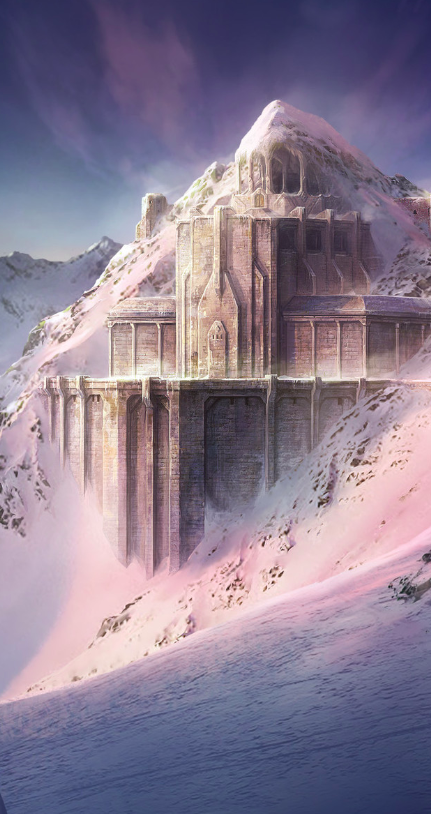
Yernaud Seat of Foundation bears the world on his back; he does not speak much but is rough and wild and may upturn his joyous burden at any moment; and he is alone in his great work.
In the morning of the world, Yernaud had his servant Moroi, Solitude and Power of Change, refine and mold seven brass bells. These bells' names go as such: Runtiy the Clear-Sounded; Poviy the Heavy-Sounded; Yot the Glory-Hound; Ornf the Golden-Headed; Fibiy the Silver-Headed; Ninf the Deep-Bellow; and Iniliy the Laughter. And Yernaud had these bells hung around the edges of the world so that whenever he rumbled or shook the bells would ring, and he could hearken the sound and be glad. So it was for a time; and all things were good.
But then the creatures of the earth were released on the land and the earth was filled with verdant growth, and Yernaud could no longer rumble and shake the world to hear the chimes for fear of harming these creatures. So it was for a time; and Yernaud sorrowed, though he never thought to abandon his post.
Suddenly, it came to the god's mind to make creatures like him, with hands and feet and an ear for music. And then these creatures, posted along the rim of the earth, would ring the bells in dazzling cacophony and he could hearken and be glad. So Yernaud did. And he made the Seven Dwarf Patriarchs, called the Fatherless. Their names go as such: Kinin the Broad; Irnfy the Red; Roltiy the Black; Powiy the Stiffbeard; Yinif the Stone-faced; Nibev the Bright-eyed; and Dibniy the Elder, who was first made.
He made them strong, so that they could pull the ropes that would twist and turn the bells; he made them great craftsmen, so that they may make small bells of their own, and adorn the undergirding of the earth with them and play music across the chasms; and he made them fierce, so that they may defend themselves in the dark places where the bells were hung, for already Gevurah Seat of Judgement began his corruption of the world in secret, and there were already ancient and hidden things which prowled creation. So Yernaud made his Dwarrow. And he was gladder than he usually was, for he was no longer alone; and he thought it was good that he could share his joy with others that shared his own mind.
But then he thought to himself that, though he did not mind being alone, his new creations might — for they would be stationed far from each other. So Yernaud made for them wives, though Dibniy, who stood perched above Yernaud's head, laid alone — for he was already in the company of his maker. And of these wives only one is ever named: Hithaer. She bore the daughter that would wed Dibniy as he set about forming the foundations of ancient Pokhrazad.
And for a time, all things were good.
The Animating of the Dwarrow
But the Dwarrow were not alive and could not animate themselves. Yernaud had to will each to move and to ring the bells. So the sweetness of the bells lessened. Yernaud had sought to share in his joy with his creations, but they had no self with which they could share in turn.
But the Great Spirit of Beauty knew what had transpired. And at the moment Yernaud's creation was complete He came to Yernaud and spoke, and Yernaud grew silent. "Why have you done this?" It asked, "Why do you attempt a thing which you know is beyond your power and your authority? For you have from me as a gift your own powers and domain only, and no more; and therefore the creatures of your hand and mind can live only by that power, moving when you think to move them, and if your thoughts be elsewhere, then standing idle. Is that your desire?"
Then Yernaud answered he did not desire that, only that he wished to share in the joy of the works of the gods in the world, and to have creations to share in the joy of his own works and to share in his heart's own desires, which longed for the sound of the seven brass bells. And in impatience, he had fallen into folly. And Yernaud offered the Dwarrow to the Great Spirit of Beauty; and he said that they ought to be destroyed, though he wept.
So Yernaud took his hammer and brought it high above his head. But the Spirit of Beauty had compassion on Yernaud for his humility; and at that moment the Dwarrow shrank and moved away and they begged for mercy. And It said, "Your offer I accepted even as it was made. Do you not see that these things have now a life of their own, and speak with their own voices? Otherwise they would not have flinched from your blow, nor from any command of your will." And Yernaud threw down his hammer and praised the Spirit. But the Spirit of Beauty would not have the Dwarrow born before the Elves, who would be the First-born, so It placed the Dwarrow kings and queens under a deep slumber until the day they might awake, and the Spirit departed.
So it had come to pass. And when the Elves betrayed the gods and the world was made round, and the foundations of the earth were forever darkened and kept hidden from the Sun and Moon, and the earth was given a heart of blazing iron, then the Dwarrow Fathers awoke in caverns beside their brass bells, and for a year the whole earth rang with the sounds of their music.
The Wars of Hate
Long the Dwarrow tried to avoid the Elvish war. But as their eastern brethren were enslaved and the armies of Abayin drew increasingly upon the west, the Dwarrow aligned themselves with the Elf-lords.
But their alliances availed them not. The victories of the West were fruitless. The defeats were long and long-suffering. The Caládolhn were extinguished. The line of Muyyaqar was murdered. The West was to be consumed by the Seat of Judgement. And all was to be lost. The Dwarrow fought bravely, but it did not matter.
So let us give thanks to Detheril the Mariner, Vahan bless him. May we sing the praises of Fionn eä Vanwi, who led the Heavenly Host and suffered mightily against Gevurah. May we play many instruments in love of the many fallen. May we adore Mathiel, who is Vahan, and may we always remember his terrible death against the World-serpent, may we remember his descent into Hell, may we remember the Doom He has averted! And through Him we are saved. May Evil at last be destroyed at the End of Days. Vahan! Let it be so!
The Silver Age
Glory be! Glory be!
Between the time of Man's ascendancy and the Elvish fading was an intermediate period when the Dwarrow dominated all politics and activity across Erub and Aran. Their underground kingdoms were weakened greatly by the Wars' end, but had escaped much of the destruction of the above-ground realms of the Men and Elves. This is sometimes called the Silver Age of the Dwarrow — the Golden Age being the time of the Dwarrow Fathers.
It was a time of incredible activity. Pokhrazad nearly doubled its hall numbers and population. Advancements in metallurgy led to the creation of sturdy protective items, such as the armors of interconnected plates. Plumbing mines were dug, and shoveled annually upwards were such vast quantities of Adamant and Mithril that entire rooms were made of the stuff. Millions of glittering gems were mined and hoarded and impressed into golden trinkets and silver baubles. Curling horns were built across the mountain peaks, and their thundering notes filled the valleys in vast orchestrations and proud demonstrations. Harps upon harps were manufactured, and the golden melodies of the Dwarrow became the standard for all harpers across the world. The Dwarf King became an imperial person. And the Dwarrow expanded over the surface world and enthralled many churls across Erub and Aran.
But this age ended in a spectacular battle between the Dwarrow of Das EkLachen and the Nelqorana, who were rising into the preeminent position they would soon enjoy for a millennium. This was the sea and land battle of Nova Concord. And the breaking of the White Gates of Das EkLachen marked the end of Dwarrow supremacy. And many Dwarrow still spit on the name of the Nelqorana.
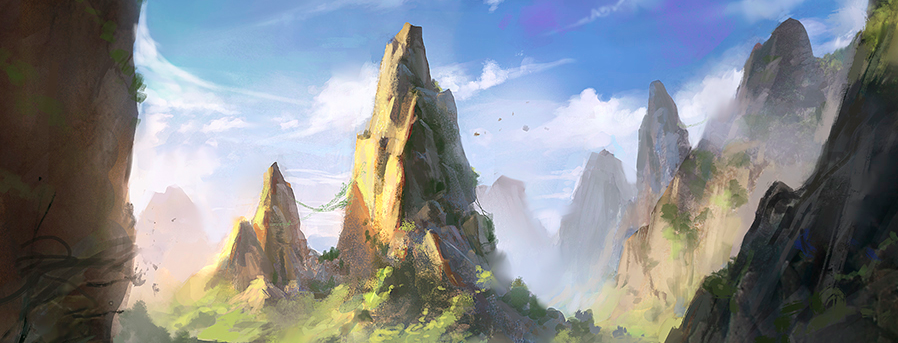
On the Dwarrow of Pokhrazad
- Halorvi
- Snuorvi
- Aznuorvi
- Isimungorvi
The most ancient of the Dwarrow people, the Dwarrow of Pokhrazad, are those formidable, dour, and oftentimes sad people who reside in the Halls of Pokhrazad. Among them is a division of four major peoples, who are divided according to the region of Pokhrazad in which they live in. The first two names, Halorvi and Snuorvi, designate the lateral distances, north and south. The last two names, Aznuorvi and Isimungorvi, designate the vertical distances, top and bottom. It should be obvious that there is great intermingling between the peoples, and that these sections mix with each other, but for the sake of simplicity we have kept the list down to four major divisions. It is claimed that Dibniy the Elder was the founder of Pokhrazad. It is claimed that he set its foundations, and that he still slumbers beneath its halls, waiting for a time of great need.
The Halorvi are the northern people of Pokhrazad and closely share in the cultural heritage of Greater Huraedon. Their region of the halls of Pokhrazad is rich in precious metals and gems, and they like to decorate themselves in golden rings and necklaces. The Halorvi are among the tallest of all the Dwarrow. The 21st Hall is in the north, and it has been the political center of Pokhrazad for two millennia. It is also the most lucrative agricultural center in the city, being the source of much Gen and Rer. The Halorvi are fierce enemies of the Dragon, and have fought many throughout their troubled history. Their mines are double the depth of their southern brethren. Their halls are also deeper and more ancient than those of the south, and their caverns within are filled with the eroded faces of old kings.
The Snuorvi are the southern people of Pokhrazad and so closely share in the cultural heritage of Lower Huraedon. Their region of the halls is rich in the base metals and minerals, and they like to decorate themselves with iron and copper rings and iron necklaces, and in great ceremonies wear large and heavy masks made out of these metals. The southern people are tall, but not as tall as their northern brethren. They control vast herds of goats and many lumber mills on the overland. Perhaps because they are less ancient, their mines are doing better than their northern brethren's, at the moment. Their halls are filled with waterfalls and bubbling streams, which have been taken and used to power machinery, and decorating these many falls are statues with water gushing out from below their lips like great beards.
The Aznuorvi are the near-above-ground people of Pokhrazad and so share in similarities to many of the Elvish and Mannish civilizations that have moved across the surface world. They are largely literate in the runic, alphabetical, and character languages of the surface. They are darker skinned and are poorer than those of the deeper halls. They have dark eyes. They are the Dwarrow that most often explore the surface, and are known for their powerful voices and expert riding skills, especially upon goats, and they are precise marksman even when mounted.
The Isimungorvi are the deep underground people of Pokhrazad and are rather unknown to the writers of this article. They are pale skinned and are wealthier than those near the above-ground. They have brightly colored eyes. Their spoken dialects are considered prestigious among the Dwarrow. Not much is known about them besides what is generally known about the Dwarrow, although we can assume they have their own peculiarities, and we know that the Isimungorvi are fighters with little love for goblins and orcs.
On the Dwarrow of Ngdheim
- Garterich
- Pimiy
A mild people. The small red furnace, the jolly, bearded faces, the singing, the beer, the grand yet cozy halls, and the delight in craftsmanship are what most think of when the word 'Dwarf' is said — and the Dwarrow of Ngdheim exemplify all of these traits. They are a jolly people. It would do everyone in the world good to visit the Halls of Ngdheim once in their lives.
Ngdheim is a small Dwarrow mansion, and its people can be roughly divided into two divisions. These are the Garterich, who are the people who manage the many waterwheels in the center of Ngdheim, and the Pimiy, who are those who live on the outskirts of the hall, and do much of the physical mining. It is claimed that Nibev the Bright-eyed set the foundations of Ngdheim, and he proclaimed that his city should be eternally glad.
The Garterich are a fair-skinned, short, rotund, and red-haired people with long and drooping eyebrows. They build and maintain the waterwheels of central Ngdheim. The Garterich are known for their skill with mechanical contraptions. Their greatest achievements deal in water, and with the manipulation of water to create strange music and sounds, and in the manipulation of water to create glittering displays of history and past great Ngdheri. They prefer to dig downwards so that their water constructions can move more freely. The Garterich, like all Dwarrow, only rarely visit the outside world.
The Pimiy are fair-skinned, slightly taller than the Garterich, and are less jolly but faster to friendship. They are brown haired. They are fierce fighters who have perfected a mobile and impenetrable phalanx formation, using lightweight but still durable spears to corral and smash the opposition — their favorite targets being rogue nobles of the Northern Empire, who raid the Ngdheri for material goods. The Pimiy are rough miners, and use the waterworks of the Garterich to great effect, blasting stone away to reveal its hidden mineral wealth. But they are delicate smiths, and their works can be comparable to the Morgondi's, being oftentimes slender and delicate seeming, though they are, in fact, hard as dragonscale.
On the Dwarrow of Felegost
- Manqzot
- Intozdhul
- Ñust'ahurun
- Qhiliquz
The Dwarrow of Felegost are a relaxed but sturdy people who live under the Enkra mountain chain in the southern continent of Aran. They have interacted with the Ishvamöinen often, and have learned to love carved, wooden halls over stone mansions. They enjoy cozy spaces, and are not given to glory seeking as their Tyrandine brethren are wont. The Felegosti have more love for the dull metals than for the precious. Their halls are wide and sprawling and are, for the most part, panelled with wood. Also, the Felegosti halls do not delve deeply into the earth, have low cielings, and their pillars are etched with familial history. It is claimed that Ninf the Deep-Bellow was the founder of Felegost. He carved the roads along the mountainsides, and proclaimed the Enkra mountain range as his and his descendants' domain.
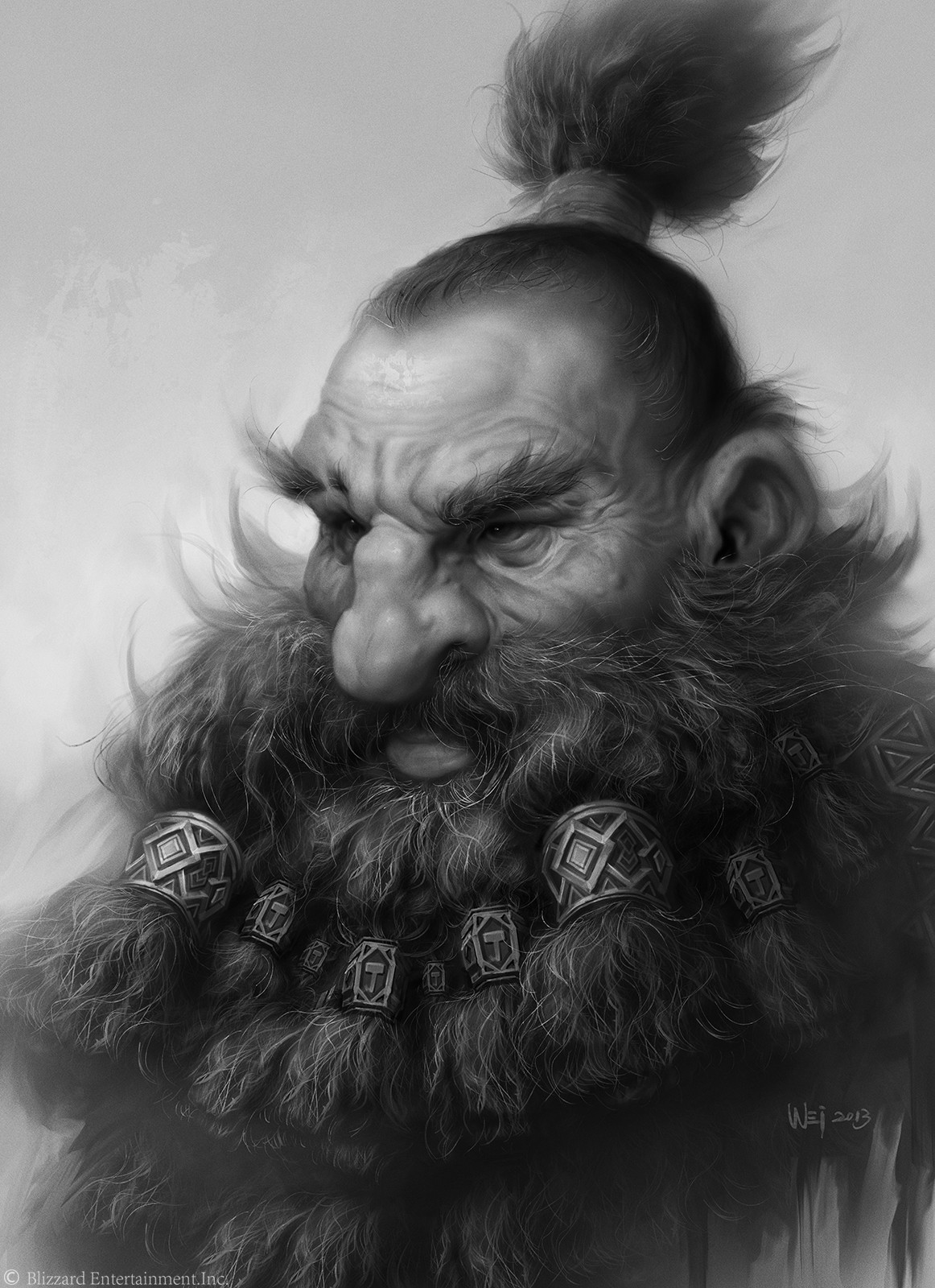
The Manqzot are the northwesterly people who have dealt with the Penku and the Ishvamöinen the most often. They are a gregarious and noisy people, given to heavy drinking and loud singing. Their favored instrument is the fortepiano, which allows them to both sing and play at the same time. They are stout and short and have soft, darkly colored, wide eyes.
The Intozdhul are the Felegosti who commonly are found near the deep sulfur pits and iron mines. They do not speak often, but when they do they are always friendly and warm. Their skin is tinged yellow, and even those born outside the pits have this coloration. They keep their beards cut short. They are a stolid but happy people who prefer working on large structures and objects over finer things.
The Ñust'ahurun are the Felegosti who reside nearest to the jungles of Aran. They have begun to colonize the jungle itself and have left their ancestral halls for the humid basin. Their beards are thick but cut short. Their eyes are dark and oblique. Their noses are large and bulbous. They are the great foresters of the Felegosti, and their voices so loudly boom over the vales and rivers that the region is rarely rid of the echoes.
The Qhiliquz are those who live in the central sections of the mansions and halls of Felegost. They are the tallest among the Felegosti, although among the Dwarrow as a whole they are of middling size. They are the best forgers, and they are the most talented in magic, able to imbue wood with hardy qualities. They are the most prestigious people among the Felegosti divisions. Grim in battle but cheery over the table, it is hard to find a more steadfast friend. They are a bright-eyed people, with bristling eyebrows, and are often decked with many iron rings, and wear heavy mixed furs.
On the Dwarrow of Tyrandoth
- Jasyiy
- Kuaryiy
- Kuimba'e
The Jasyiy are the deep mountainous people of the Tyrandine and rarely appear above ground. They are stout and bright-eyed. They are the great quarriers and sculptors of the region. They are skilled with the chisel and in moving massive amounts of stone. They are used to conflict, and battle often. Thoughtful and proud, the Jasyiy dislike being snubbed. Their favorite instrument is a reed instrument called the Polb. It has a thin sound, and the noise carries a far distance — even in the jungle.
The Kuaryiy are the Dwarrow that skirt the edges of the Tyrandoth Mountains. They are few in number, and not much is known of them, besides that they have a keen sense for where one may find topazes and rubies — the Tyrandine's favorite gems.
A Dwarf of the Kuimba'e people is a member of a colonial heritage. The Tyrandine have expanded their dominion onto the flatlands of the jungle. Kuimba'e are swarthy and bright-eyed. Being always near the dangerous jungles of the Eastern Marches, they have become nimble fighters. The majority of the mountain-dwelling Tyrandine distrust the Kuimba’e, as their culture has grown strange; and the Kuimba'e spend more time above ground than under, for they prefer the open air over their sprawling complexes of snug burrows.
On the Dwarrow of the Das
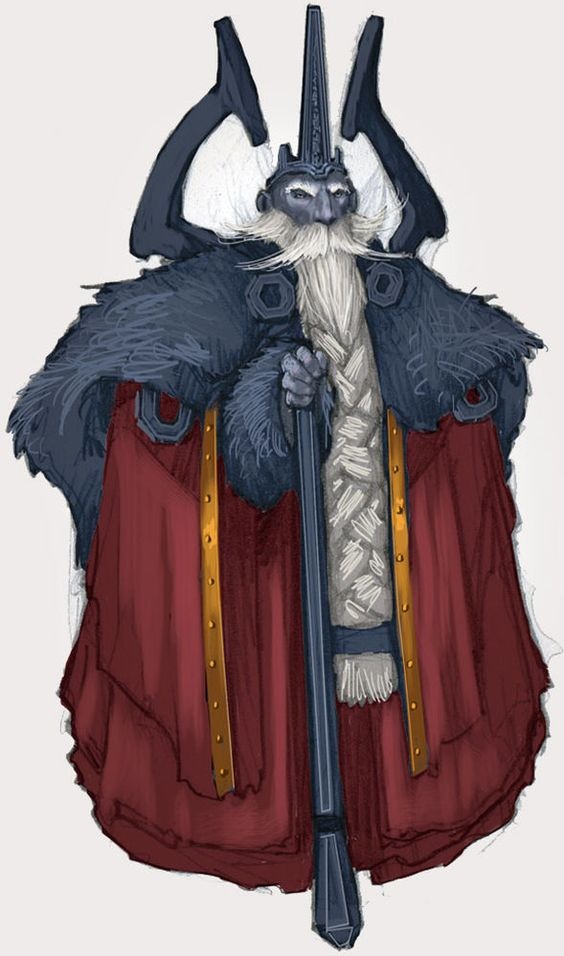
A tragic people who have lost everything. The Dwarrow of the Das were once the most populous and powerful of the Dwarrow and had many halls and kingdoms across Erub, but were reduced to nothing by the end of the Blood Wars over 200 years ago due to the maneuvers of Gaorung the Ever-Present. The few who remain are of the Belchara people, and are called the Blue Dwarrow for their skin color. They cling to old and petty hatreds and wish to reclaim their lands. But they will not accept any help. So they rot in the Belcharin Echelons, and they will continue to rot for years to come. As most records of the Das Dwarrow were destroyed in the ensuing chaos of their kingdoms' falls, and because all their homes have become the breeding grounds for dangerous creatures, there is little the scholars of Juraedon know for sure about any of these people. Records of prior contact are our best method of discovering more, but the Das Dwarrow were always reclusive, preferring their own kin, and so shared little of their knowledge with outsiders.
It is claimed that Kinin the Broad laid the foundations of the mountain kingdoms of Erub, and he called upon his descendants to spread beneath the earth as far as the sky spreads above it.
The Belchara were the largest ethnic group of the Belcharin Union, which lay under the entirety of the Western Mountains. They were a white-haired, white-eyed race with blue skin, and were the tallest of all the Dwarrow. They were gifted with the ability to easily cast spells, and had quickly expanded and created a unified empire under the mountains. The Belchara had a mind for organization and state making. And their theories on smith working were often seminal. They were fond of huge musical instruments that spread across the landscape and, when played, would make a thunderous noise that would shake the earth and sky. The Belchara were always a proud people, but their fall turned them hateful and cruel.
The Polchara are a rarely mentioned division of people of the Belcharin Union. They seemed to be a stern, aristocratic group that was believed to be sacred due to their blood connection to the Fatherless Patriarch Kinin the Broad. They were a silver-skinned people. But beyond that, not much can be said.
The VolKernen were a major people in the Halls of Das Eklachen, which lays under the Mountains of Das EkLachen to the north. They are similar in appearance to the Halorvi people of Pokhrazad. There are a few VolKernen left in the fjords of Juraedon Proper, but they are kingdomless. These remaining VolKernen enjoy building log houses on the mountains slopes.
Lastly, the EkLachen, who were exiled from their northern halls of Das EkLachen due to Gaorung's vicious assaults. Later, they resettled in the Belcharin Union only to be attacked by Gaorung again; and then they were finally wiped out as a people. It is said that the EkLachen were quick to laugh and were talented in Magic. They were the spirited, northern twin to the rather dour, western Belchara.
On the Diasporic Dwarrow
Not every Dwarrow is born or has lived in one of their great ancestral halls. There are many Dwarrow who have lived their entire lives above ground, though they are only a small minority amongst the total Dwarrow population. Nevertheless, these Dwarrow are the ones with whom most people will have interfaced with, and are usually descended from some group that had been exiled or separated from one of the major halls long ago. Collectively, they are called the Diasporic Dwarrow; and most famous among these groups are the Pinkard Dwarrow, who live in great numbers in the Small Dwarf Hills. Another famous diasporic people are the Quenisian Dwarrow — an old community only slightly younger than that of the Gnomish community in Quen.
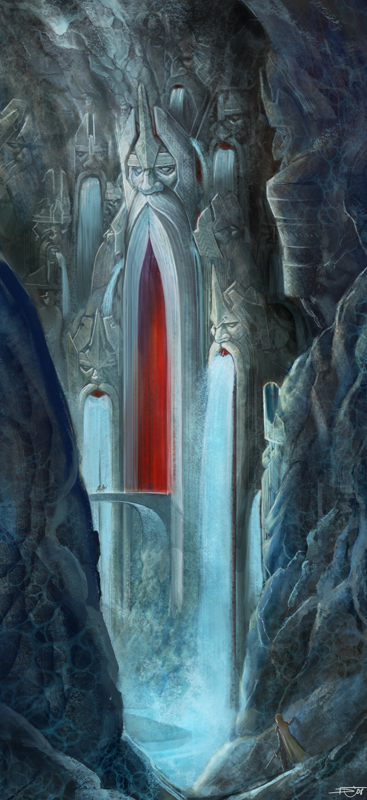
"Such was the tale that Nar brought back to Thrain; and when he had wept and torn his beard he fell silent. Seven days he sat and said no word. Then he stood up and said: 'This cannot be borne!' That was the beginning of the War of the Dwarves and the Orcs, which was long and deadly, and fought for the most part in deep places beneath the earth."
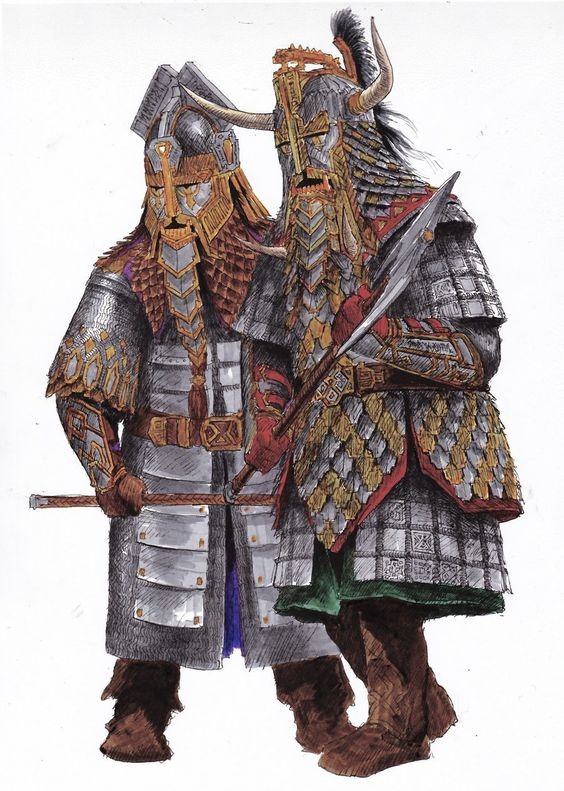
"Last of all the eastern force to stand firm were the Dwarves of Belegost, and thus they won renown. For the Naugrim withstood fire more hardily than either Elves or Men, and it was their custom moreover to wear great masks in battle hideous to look upon; and those stood them in good stead against the dragons."
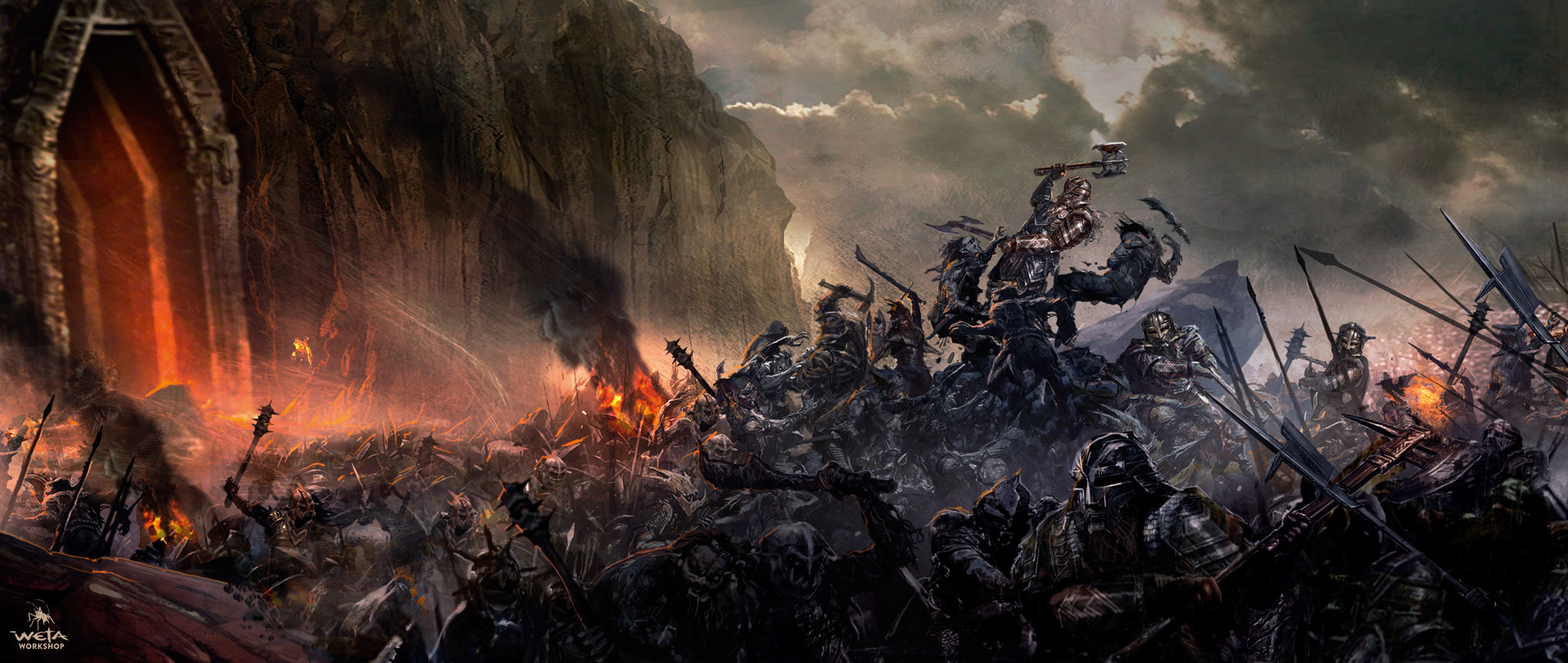
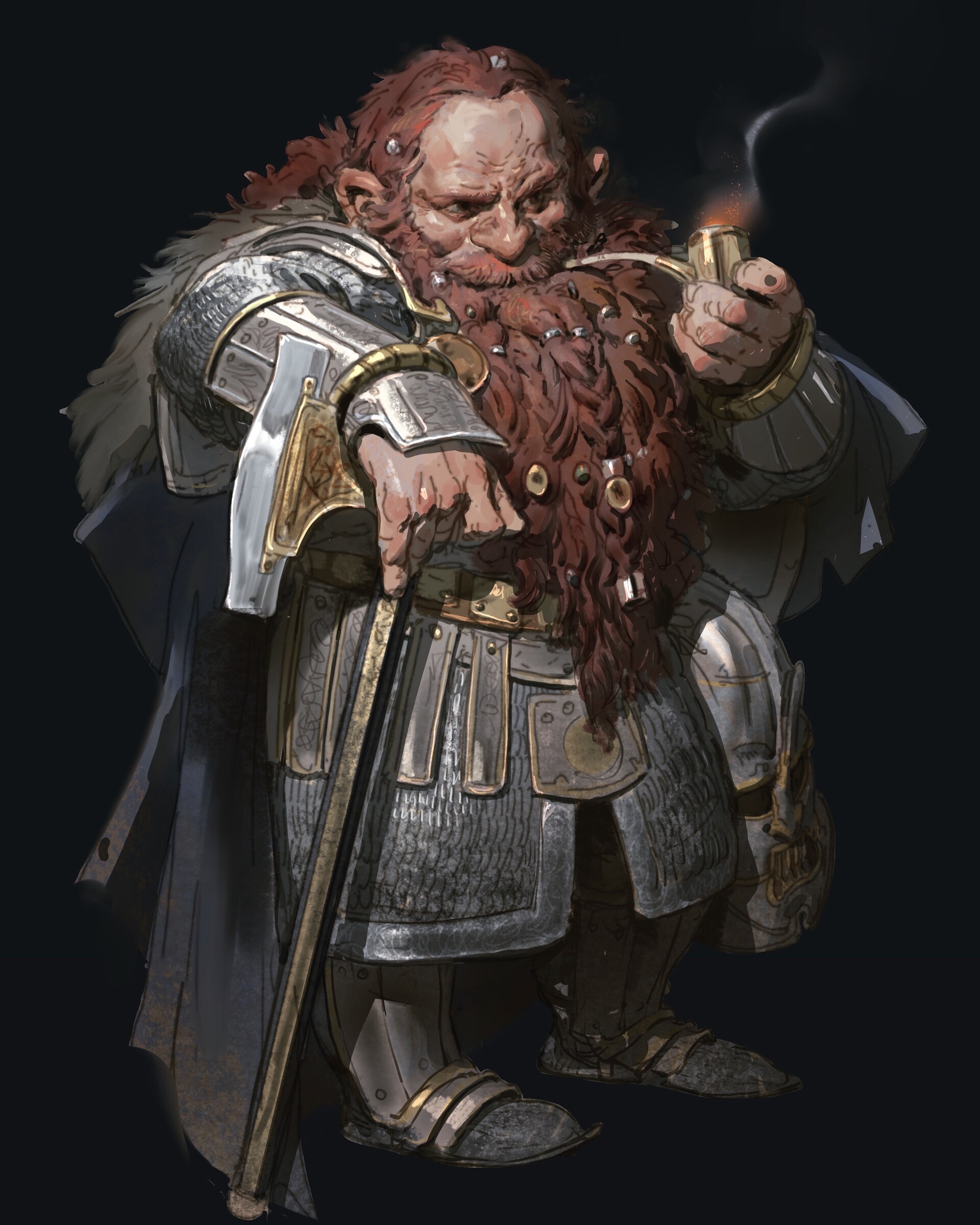

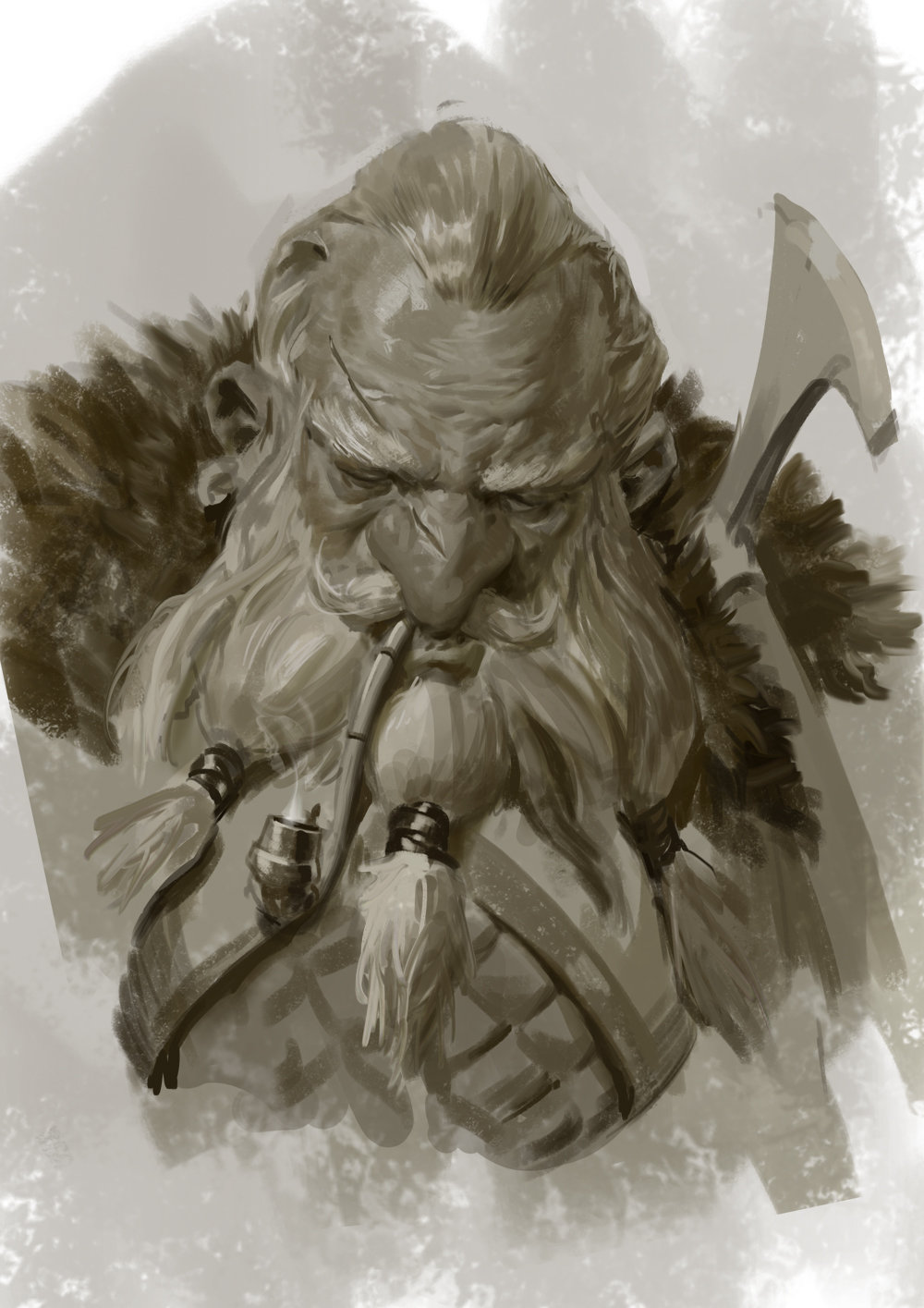

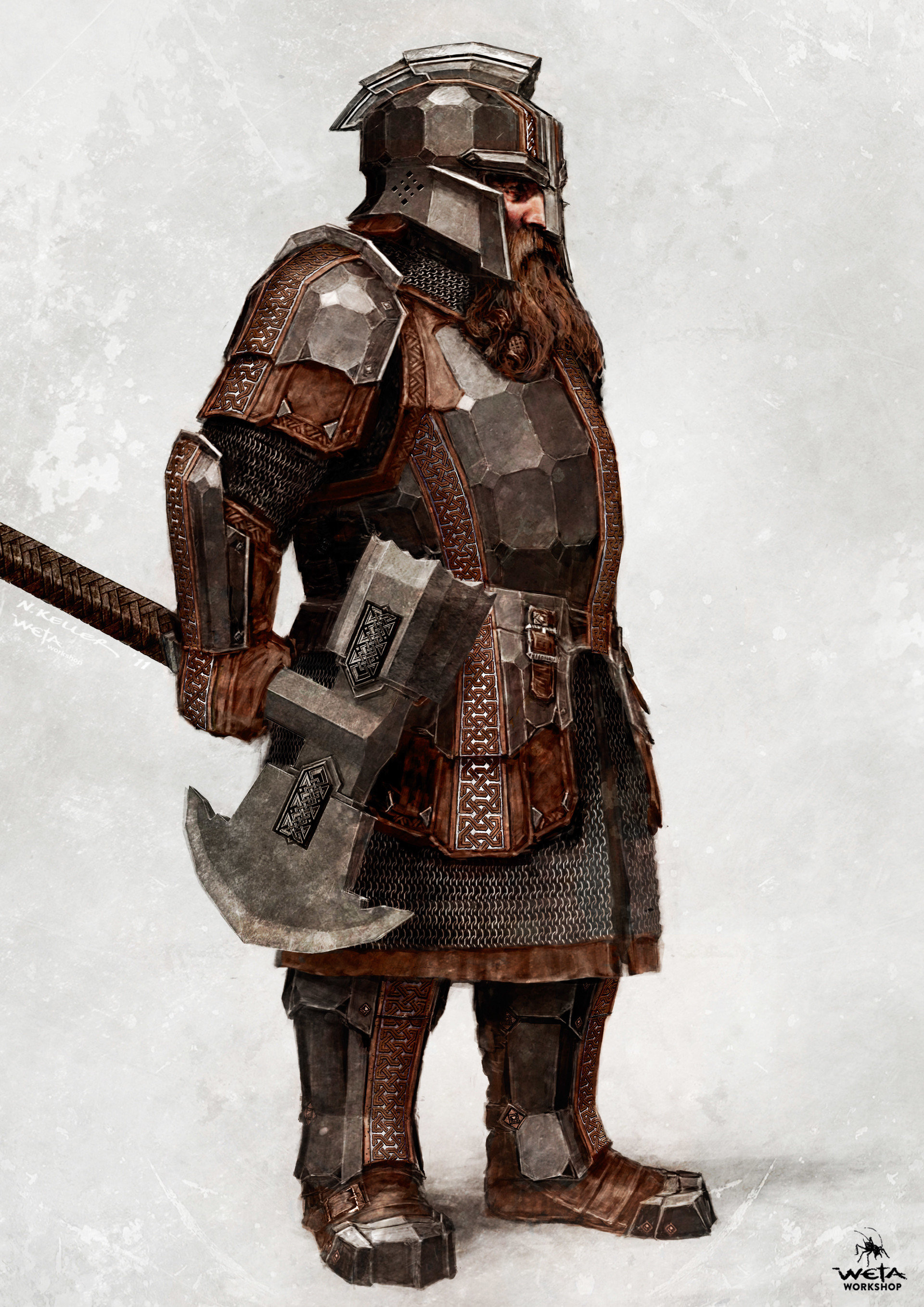


Comments
Author's Notes
I am in debt to Turner Mohan's article on Dwarven women, and it ought to be read by more people. It is a beautiful, thoughtful, and precise piece on his general beliefs of Tolkien's Dwarves, and is not strictly just about the women.
Furthermore, it's probably obvious that I've taken more than the usual amount of influence from Tolkien for these Dwarves than for my other races. The section of the Dwarf creation by Yernaud is a pure imitation of Tolkien, which I did because that story is, to me, the best story told to explain the nature of my favorite sort of Dwarves; and I have no other story to tell that may better it.